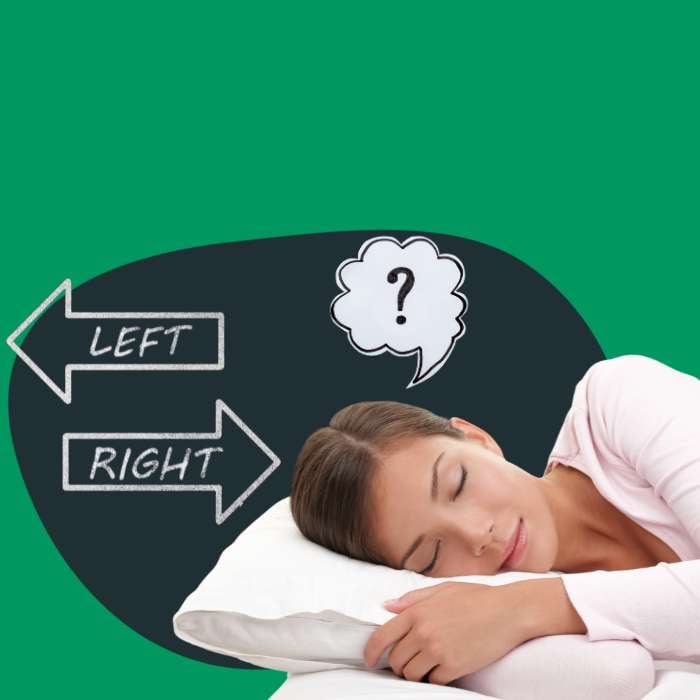Key Takeaways:
- An eardrum rupture is a tear in the membrane that separates the ear canal from the middle ear space and can happen due to a condition, such as an ear infection.
- Most people prefer to sleep on the side that is most comfortable for them, regardless of which side has the eardrum rupture.
- While pressure build-up prior to an eardrum rupture can be uncomfortable, the ruptured eardrum is usually not painful and does not require time off from work.
.png)
As an audiologist, I have worked with many patients suffering from ear infections and eardrum ruptures. Understandably, they often have questions about the healing process and how to make themselves comfortable while their eardrum heals. One common question I hear is which side they should sleep on with a ruptured eardrum. In this article, I will provide tips for sleeping comfortably and aiding in healing when dealing with a ruptured eardrum.
What is an eardrum rupture?
An eardrum rupture, or a tympanic membrane perforation, is a condition where the thin membrane separating your ear canal from your middle ear (the eardrum) tears or develops a hole. This can occur due to various factors, such as a severe ear infection, sudden pressure changes, loud noise blasts, or direct ear injury. Symptoms of an eardrum rupture include pain (which might be severe), a discharge of fluid from the ear, hearing loss, tinnitus (ringing in the ear), and sometimes, vertigo. It's a condition that needs proper attention and careful management for appropriate healing.

Which side should I sleep on?
You might think that sleeping on the unaffected ear is the best approach when dealing with a ruptured eardrum. However, it's important to stress that you can usually sleep on either side without worsening the condition or adding undue pressure to the already damaged eardrum. The more important point is on which side you feel most comfortable sleeping.
As part of the healing process, it's crucial to maintain your overall well-being with proper rest and hydration. Staying well hydrated and ensuring you get a good, restful night's sleep are both vital components. Proper hydration and adequate rest give your body the tools to heal effectively.
Should I take time off work with a ruptured eardrum?
Whether or not you should take time off work due to a ruptured eardrum depends largely on the condition that caused the rupture and the nature of your job. In most cases, the act of rupturing is more painful than the actual presence of the eardrum rupture. If the pain and discomfort are manageable, you may continue working.
Still, it's crucial to understand that exposure to water, dirt, and debris should be avoided until your eardrum is completely healed. Jobs that involve these conditions may require temporary accommodations or even time off to ensure proper healing. For example, a carpenter who works around sites with sawdust, soot, or other debris may need to make adjustments to avoid these hazards.
Each individual's recovery journey is different, and what works for one person may not work for another. Therefore, it is highly recommended to seek advice from your healthcare professional about what is best for your particular situation. This will allow you to make an informed decision regarding any necessary adjustments at your workplace.

Does an eardrum rupture cause pain?
An ear infection leading to an eardrum rupture can indeed be quite uncomfortable. The discomfort often arises from the pressure that builds up behind the eardrum, leading to intense pain. Interestingly, the actual eardrum rupture can sometimes relieve this intense pressure and, thus, alleviate the pain to some extent. Nonetheless, it's important to note that the cause of the rupture will significantly influence whether you experience pain and the degree to which you feel it. For instance, a rupture caused by a sudden loud noise or trauma may result in a higher degree of pain than an ear infection. As always, every individual's experience will vary, and it's essential to seek professional medical advice if you're experiencing pain or discomfort from a ruptured eardrum.
Should I go to the emergency room with a ruptured eardrum?
In most cases, a ruptured eardrum is not a medical emergency and can be treated by a doctor during regular office hours. However, there are a few situations when a visit to the emergency room may be necessary. These include if a head injury caused the rupture if there is significant bleeding or fluid drainage from the ear, or if there is severe ear pain or fever.
What not to do
Avoid putting anything in the ear, such as cotton swabs, bobby pins, or other objects that cause further damage and delay healing. If your ear canal itches, your provider may recommend a cream or ointment to help ease discomfort.
Additionally, do not expose the ear to water, avoid blowing your nose forcefully, or other activities as advised by your doctor. It is also recommended to avoid smoking and close contact with others who are smoking, as it can increase the risk of infection.
Conclusion
In conclusion, navigating the experience of an eardrum rupture takes some care. Still, it's important to remember that this condition is often manageable and can heal with time and proper care.
Rest, hydration, and comfort are the cornerstones of recovery. The positioning of your sleep, the continuation of your work, and dealing with pain all depend on individual circumstances and comfort levels. Any severe symptoms warrant immediate medical attention. Remember, the aim is to alleviate discomfort and promote healing, so avoiding further damage by inserting objects or exposing your ear to water is paramount.
Lastly, remember every healing journey is unique. Consult with your healthcare provider for personalized advice, and rest assured that, with time and care, recovery is on the horizon.






